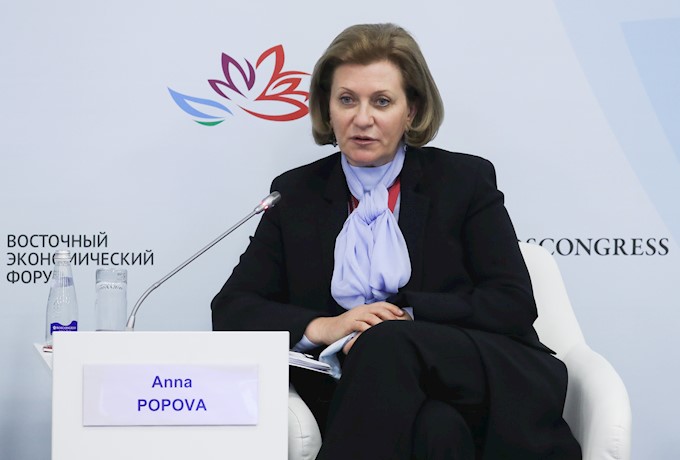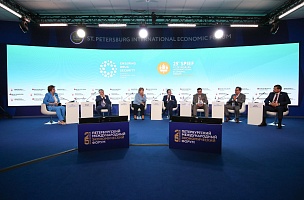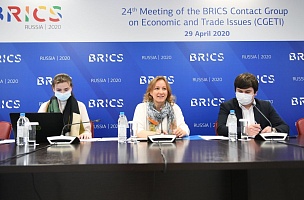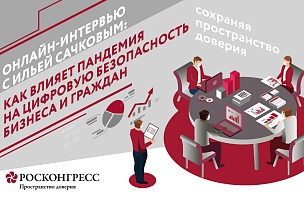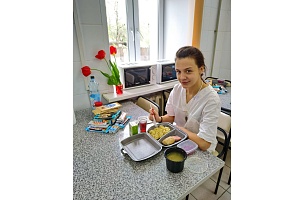KEY CONCLUSIONS
Russia managed to develop an effective system to fight the pandemic, a so-called sanitary shield is also being raised outside of the country
“Today, we are talking about building a sanitary shield, which does not mean that we are only building it around our border. Infections do not recognize borders, that is obvious,” Anna Popova, Head of the Federal Service for Surveillance on Consumer Rights Protection and Human Wellbeing – Chief State Sanitary Physician of the Russian Federation.
“We see that you can rely on a well-organized healthcare and security system,” Dorit Nitzan, Regional Emergency Director for the European Region, Health Emergencies Programme, World Health Organization.
“I travelled abroad this year and I found out that a lot of people know and envy that vaccination is freely available here, which is not the case, say, in Italy,” Lilia Ovcharova, Vice Rector of the National Research University Higher School of Economics.
Sports and tourism accepted the restrictions with understanding and managed to cooperate with Rospotrebnadzor
“As we were locking down federal sports bases, the athletes were not happy with that, many coaches said, “Why, the Olympics are coming!” It was not easy to explain that if someone got ill and if we did not comply with the requirements, if we did not make a temporary break in training, it could be impossible to resume, a career might be ruined and even a life might be lost. We found understanding with the sports community. It is crucial that everyone is responsible for everyone. If we want to go on working and living effectively, communicate, we should understand that each and every one of us is responsible,” Oleg Matytsin, Minister of Sport of the Russian Federation.
“Following Rospotrebnadzor’s recommendations, we are gradually moving towards lifting the restrictions. We resumed flights to Turkey which is one of the most popular destinations with our people. Egypt is gradually starting up – this is also a result of our tight collaboration. <…> It is our first experience of close collaboration. For me, it has been a positive experience. Of course, we want more, and we talk on the phone with Ms. Popova (Anna Popova, Head of the Federal Service for Surveillance on Consumer Rights Protection and Human Wellbeing – Chief State Sanitary Physician of the Russian Federation) to share information, I tell her that we have certain destinations and obligations to our citizens. We want tour operators to comply with their commitments as much as possible, so that people could go on holiday. It is great that there is a close professional dialogue,” Zarina Doguzova, Head, Russian Federal Agency for Tourism.
PROBLEMS
Mixed response to the information about the pandemic, a need for preventive actions as situations of this kind occur and for working out new tools other than restrictive measures
“This is of course a new challenge which we are definitely assessing and have to assess after working with it a little more, I mean the infodemic. The situation which is developing and was developing from the beginning in a completely new information environment. Communication capability is enormous and trust in the information coming from an official or a scientist, or a neighbour turned out to be different,” Head of the Federal Service for Surveillance on Consumer Rights Protection and Human Wellbeing – Chief State Sanitary Physician of the Russian Federation.
“First, we see increasing demand in reliable information. <…> Now, everyone is an epidemiologist, especially on social media, and people have gone through this stage, they absorbed that unverified information, and we are carrying out a study of social sustainability and we see demand for reliable information,” Lilia Ovcharova, Vice Rector of the National Research University Higher School of Economics.
“One of essential components if this global problem, which is going to be handled by Rospotrebnadzor’s research institutions, is a system of preventive measures for emerging threats,” Sergey Balakhonov, Director, Irkutsk Research Anti-Plague Institute of Siberia and the Far East.
“Countries are less and less ready for imposing social distancing measures. They are out of available options. Communities and whole lives were cut off from normal life. Now, to prepare ourselves to new pandemics, we need innovations, fast provision of services to people in other sectors. We must exploit emerging innovations as early as possible to provide preventive actions,” Dorit Nitzan, Regional Emergency Director for the European Region, Health Emergencies Programme, World Health Organization.
SOLUTIONS
Spread of infection can only be stopped by joint effort
“We can only effectively fight emerging epidemic threats through honest intergovernmental cooperation as it was done with Mongolia, as it is done with China regarding natural-focal diseases, and COVID-19,” Sergey Balakhonov, Director, Irkutsk Research Anti-Plague Institute of Siberia and the Far East.
“We must work together. We have been cooperating from the very beginning, me and my colleagues from the CIS countries, from near and far-abroad countries,” Anna Popova, Head of the Federal Service for Surveillance on Consumer Rights Protection and Human Wellbeing – Chief State Sanitary Physician of the Russian Federation.
“The pandemic emphasized how important it is to provide sanitation and safety in the world. This will require significant effort from all countries. Communities should be involved in working out these measures,” Dorit Nitzan, Regional Emergency Director for the European Region, Health Emergencies Programme, World Health Organization.
Vaccination must be accelerated and become available to as many people as possible, information regarding vaccination should be delivered in a more comprehensible manner
“The information should be delivered differently even in different regions of Russia and the more so in different social and age groups. To communicate the information…, we need to polish up new forms of communication to make sure that this information is spread and received fast,” Head of the Federal Service for Surveillance on Consumer Rights Protection and Human Wellbeing – Chief State Sanitary Physician of the Russian Federation.
“We must expand vaccination as fast as possible before the winter comes, we must share doses and eliminate disparity across countries and regions. We must revise vaccination strategies to provide vaccines to the most vulnerable groups of people,” Dorit Nitzan, Regional Emergency Director for the European Region, Health Emergencies Programme, World Health Organization.
“It is very important to have resources to provide educative information on how to protect yourself,” Lilia Ovcharova, Vice Rector of the National Research University Higher School of Economics.
For more information, visit the Roscongress Foundation's Information and Analytical System at www.roscongress.org


